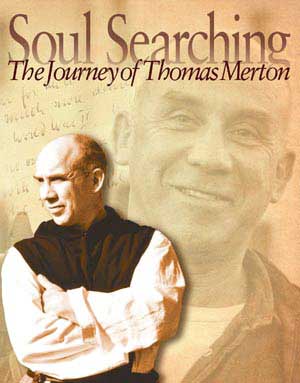

By Matthew Ralph
Forty years ago today,a celebrated writer, poet, social activist and Trappist monk was electrocuted after stepping out of a bathtub in Bangkok and touching a short-circuited electric fan.
The 53-year-old resident of the Abby of Gethsemani in rural Kentucky was Thomas Merton.
Best known for his autobiographical best-seller “The Seven Storey Mountain,” Merton published more than 60 books, wrote hundreds of essays and influenced generations of spiritual seekers, activists and writers.
Few have explored the remarkable accomplishments or the settings that influenced his spiritual journey more than Louisville-based filmmaker Morgan Atkinson. A veteran filmmaker, Atkinson traced Merton’s journey for the PBS documentary “Soul Searching: The Journey of Thomas Merton.” The film, which will air on PBS this Sunday, also has a companion book Atkinson compiled with Jonathan Montaldo.
I caught up with Atkinson on e-mail to talk about a man whose soul-searching journey first caught my attention when I checked “Seven Storey Mountain” out of my college library a decade ago and continues to inspire me and thousands others four decades after his untimely death.
When did you first discover Thomas Merton? What was your initial reaction?
I grew up about 60 miles from the Abbey of Gethsemani, Merton’s home, but I wasn’t aware of him or his writings until I was in my mid 20s. My first impression was, “hmmm, this isn’t your your everyday preacher. (Growing up a Presbyterian I thought of every religious
type as a preacher). He actually seems to have experienced life in ways that I have. I’m actually interested in what he has to say and want to know more.”
At what point did you decide you were going to devote several years of your life filming a documentary and compiling a book about his life and work?
I did a documentary about life at the Abbey of Gethsemani in 2001-02. I enjoyed the experience a lot and it gave me the guts to presume I could do a program about Merton. I didn’t think i had any great insights about Merton myself but through the Gethsemani project I had made friends or established contacts with people who did have significant things to say.
You’ve no doubt encountered a lot of interesting characters and figures who have become subjects in your films over the course of your career. Was Merton just another one of those interesting subjects or was there something different about him?
Merton is definitely one of a kind. I’ve never done a story about anyone who could match his combination of intellectual depth and personal appeal.
How would you say this film and the film you did about the Abbey of Gethsemani have differed from your other works?
Most of my work (and most media today) you try to keep busy, busy, busy. Lots of action. “Dead air” is a cardinal sin. When trying to show a monk’s life you have to try to capture the stillness and quiet that is an essential component of their vocation in a way that doesn’t have people searching for the channel changer.
What was the most eye-opening aspect of what would seem like a rather daunting task of making a film about Merton? What was the biggest challenge?
The biggest eye-opener is just how much he wrote and complex he was. This led to the biggest challenge and frustration. You know in one hours time you can’t do justice to the breadth and depth of his thought. So in broad strokes you try to interest viewers in going
more deeply on their own.
This being the 40-year anniversary of his untimely death, a lot of people have been rediscovering Merton’s writings or discovering him for the first time. Why do you think Merton continues to be such an inspiration to so many people?
Merton continues to be relevant because his themes are perennial. He writes accessibly about issues that humans have pondered for thousands of years. He inspires people because he wouldn’t accept pat answers. He challenged authority and kept pushing for ultimate truths.
What do you hope those who see the film will take away from it?
I hope people see something of Merton’s joy in life and find that it helps them live more fully.
What impact would you say the making of the film and the compiling of the book has had on your own spiritual journey?
One of Merton’s students says in the film that he did teach a certain meditation method or technique. He said to simply settle down and be still. That seems like a good challenge.
Leave a Reply